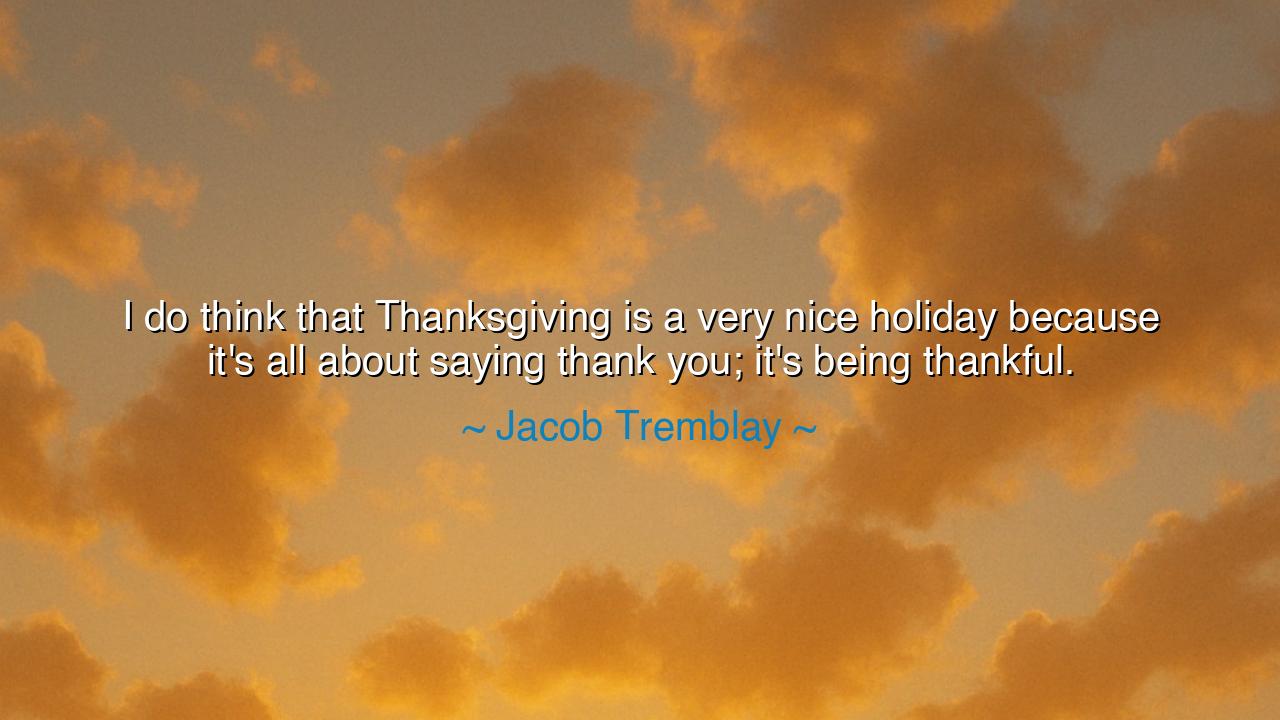
I do think that Thanksgiving is a very nice holiday because it's
I do think that Thanksgiving is a very nice holiday because it's all about saying thank you; it's being thankful.






The words of Jacob Tremblay are spoken with the innocence of youth but with the clarity of timeless truth: “I do think that Thanksgiving is a very nice holiday because it’s all about saying thank you; it’s being thankful.” In this simple reflection lies wisdom that stretches across cultures and centuries, for the act of giving thanks has always been the foundation of harmony between peoples, between families, and even between humanity and the divine. His words remind us that the essence of a day is not in its feasts or its rituals, but in the spirit that binds them together—gratitude.
The holiday of Thanksgiving has its roots in the gathering of harvest, in the recognition that food and life itself are not to be taken for granted. Across civilizations, we find festivals of thanks: the ancient Greeks with their Thesmophoria, the Hebrews with their Feast of Tabernacles, and countless other peoples who paused after the harvest to lift their hearts in gratitude. Tremblay, in his youthful voice, speaks to this ancient rhythm of human life: to pause, to gather, and to say, “thank you.” Without such remembrance, abundance turns to greed, and prosperity becomes arrogance.
To be thankful is to acknowledge that we are not the sole authors of our blessings. The farmer thanks the soil, the rains, and the labor of his fellows. The family thanks one another for love and care. The community thanks those who protect, serve, and provide. And the soul, if wise, thanks the higher powers, fate, or God for the mystery of life itself. Gratitude is not weakness, but strength, for it humbles the heart and strengthens the bonds between people.
History shines with examples of those who embodied this spirit. Consider George Washington, who proclaimed the first national Thanksgiving in America, not to exalt conquest, but to give thanks for unity and provision. Or recall Abraham Lincoln, who in the midst of civil war, established Thanksgiving as an annual tradition—not as a celebration of victory, but as a reminder to a fractured nation to pause and be grateful for what still endured. In both cases, leaders recognized what Tremblay so simply expresses: that a nation bound in gratitude is stronger than a nation bound in pride.
What makes Tremblay’s words striking is their clarity: “It’s all about saying thank you.” Too often holidays are consumed by distractions—feasts, parades, or commerce. Yet at the heart, this day is not about what we take in, but about what we give back—our words of appreciation, our remembrance of blessings, our acknowledgment of those who have carried us. It is the spoken act of gratitude that transforms a meal into a celebration, and a gathering into something sacred.
The lesson we must take is this: cultivate gratitude not just on holidays, but in every day. Do not wait for the feast to say “thank you.” Let gratitude become your daily offering—thanking parents, friends, colleagues, even strangers whose kindness or labor touches your life. And let gratitude extend beyond words into action: share what you have with those who lack, for this is the highest form of thankfulness.
Therefore, let us live the spirit of Tremblay’s words. Each day, awaken with thankfulness on your lips, for life, for breath, for the people who walk beside you. Teach children the value of saying thank you, for in their innocence lies the seed of future wisdom. And when the days of feast come, let the table not only be filled with food, but with gratitude spoken aloud. For the wisdom of Jacob Tremblay reminds us that the truest celebration of life is not in having much, but in being thankful for what we already have.






AAdministratorAdministrator
Welcome, honored guests. Please leave a comment, we will respond soon